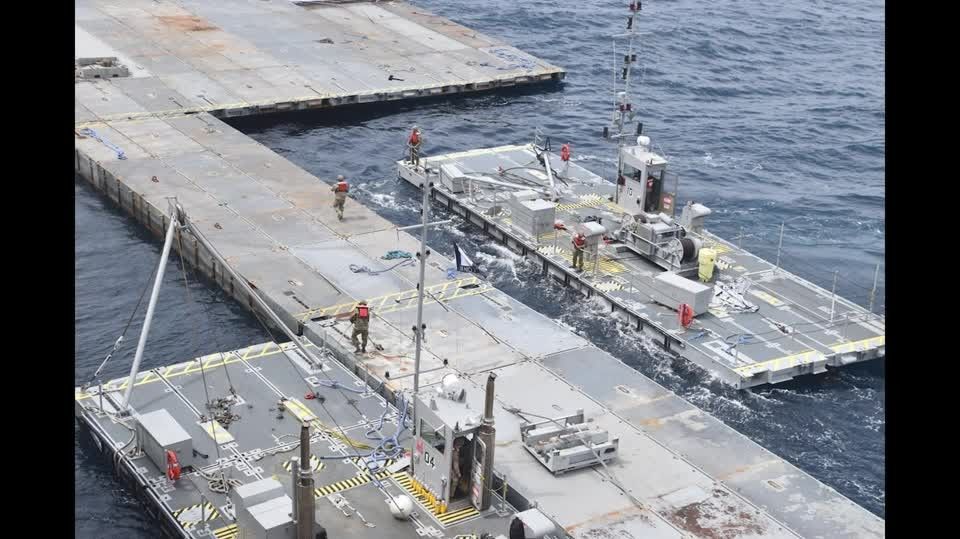UPDATE: 5/27: Military vessels supporting the trident pier anchored to the beach in Gaza broke off during "high sea states" and are now being recovered, according to the Pentagon in a briefing Tuesday. In addition, sections of the pier need rebuilding after another piece broke off earlier Tuesday. The pier will therefore be removed from its anchored position and be moved to the Israeli port of Ashdod for repairs. Operations will cease, as this will take over a week, according to the Dod. So far, over 1,000 metric tons of aid has been delivered to the staging ground at the beach. It is not clear how much, if any, of the aid is actually getting into the Gaza population from the warehouses there.
UPDATE 5/26: The support system for the U.S. military's humanitarian pier broke off amid choppy waters Saturday and was moored in two places, on the beach near the pier and on a Israeli beach at Ashdod, according to Pentagon officials:
Four boats stabilizing the $320 million structure detached, U.S. Central Command, which is responsible for military operations in the Middle East, said Saturday. Two of them floated northward, eventually landing on the beach in Ashdod, Israel, it said. Two others are now anchored on the beach near the pier, the military said, adding that the dock is still operational despite the damage. It said that no U.S. military personnel would enter Gaza.
“Efforts to recover the vessels are under way with assistance from the Israeli Navy,” U.S. Central Command said.
Officials also said that three service members were hurt in accidents on the pier this week, one seriously, but they have offered no additional details. Story developing.
ast week, the U.S. military finally completed a long-awaited temporary pier to bring aid into Gaza, which American officials hope will alleviate the famine gripping the besieged region. There’s just one catch: None of that aid has actually been distributed to starving Palestinians.
After desperate locals looted an initial convoy of aid Saturday, officials have had to rethink their approach to distributing the life-saving supplies. The shipments are now headed to a warehouse from which they will be distributed to humanitarian groups “in the coming days,” a Pentagon spokesperson said Tuesday. (“Conditions permitting,” he added, in an apparent reference to the fact that the pier can only operate in exceptionally calm waters.)
The messy start to the pier’s operations appears to confirm the frustrations of many humanitarian groups, which have attacked the $320 million plan as a distraction from more serious efforts to bring aid into Gaza. Jeremy Konydnyk, a former White House public health official who now runs Refugees International, slammed the effort as “humanitarian theater.”
“The pier doesn't solve the major bottleneck in Gaza: aid access for last-mile delivery,” Konydnyk argued. In his telling, the key questions are about whether aid groups can safely access their warehouses and move without fear of attack by Israel or Palestinian armed groups.
“The pier has sucked up a huge amount of diplomatic and political energy at huge financial cost — yet has delivered little and is irrelevant to the fundamental last-mile access impediments,” he continued.
As Konydnyk noted, the Israeli military has complicated efforts to deliver aid with its invasion of Rafah, a city in southern Gaza that previously served as a key node for humanitarian groups. Israeli forces have pushed nearly a million Palestinians from the city in recent weeks, and the United Nations says its operations in the area are now on the verge of collapse.
The expanding Rafah operation has almost entirely stopped imports of aid through crossings in Gaza’s south, according to the UN. Despite Israeli promises to increase the flow of aid, only 132 humanitarian trucks have gone through southern land crossings in the past 17 days. Aid agencies say no fewer than 500 trucks of aid are needed daily in order to slow a growing famine.
The pier has so far fallen far short of filling that gap, distribution issues aside. The U.S. has only gotten 569 tons of aid into Gaza in five days of operation — the equivalent of about 20 fully-loaded trucks.
And lurking behind all of these concerns is the possibility that the pier could drag the U.S. into the Gaza war directly. Palestinian militants fired on the staging area during construction, leading Secretary of Defense Lloyd Austin to admit that U.S. soldiers could find themselves exchanging fire with Hamas or Palestinian Islamic Jihad.
Given these risks, it’s well past time to give up on the pier plan, according to Michael DiMino, a former CIA analyst who now works as a fellow at Defense Priorities.
“We need to stop the reckless theatrical performance that is this Gaza pier immediately,” DiMino wrote.
- Sec Def: US military on pier can respond if shot at in Gaza ›
- Staging ground for US military aid pier in Gaza attacked ›
- Washington is not telling truth about the Gaza pier | Responsible Statecraft ›
















